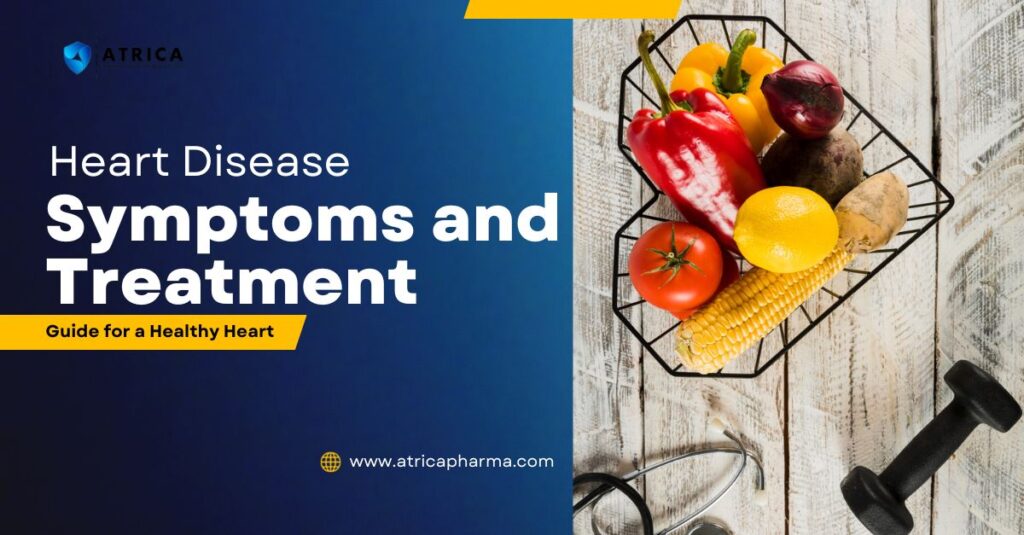
Heart Disease: Symptoms and Treatment Guide for a Healthy Heart
Heart disease, a broad term encapsulating various cardiovascular conditions, stands as a significant global health concern. In this detailed exploration, we will unravel the intricacies of heart disease, focusing on its myriad symptoms and the diverse spectrum of treatment options available to those navigating this intricate landscape.
Unmasking Heart Disease

Definition and Types
Heart disease encompasses a range of conditions affecting the heart and blood vessels. It includes coronary artery disease, heart failure, arrhythmias, and valvular heart diseases. Each type has its unique set of symptoms and treatment approaches.
Common Risk Factors
Several risk factors contribute to the development of heart disease. These include age, family history, high blood pressure, high cholesterol, smoking, obesity, and diabetes. Understanding these risk factors is key to adopting preventive measures.
Recognizing the Symptoms
The symptoms of heart disease can vary depending on the type and severity. Common signs include chest pain or discomfort, shortness of breath, fatigue, rapid or irregular heartbeat, dizziness, and swelling in the legs. Recognizing these symptoms is crucial for early intervention.
Diagnostic Procedures

Physical Examination
A thorough physical examination by a healthcare professional is often the first step in diagnosing heart disease. This may involve checking blood pressure, listening to the heart, and assessing overall health.
Blood Tests
Blood tests can reveal crucial information about heart health, including cholesterol levels, blood sugar levels, and markers of inflammation that may indicate the presence of heart disease.
Electrocardiogram (ECG or EKG)
An ECG records the electrical activity of the heart, helping identify irregularities in heart rhythm and potential issues with the heart’s structure.
Imaging Tests
Various imaging tests, such as echocardiography, stress tests, and coronary angiography, provide detailed images of the heart’s structure and function, aiding in the diagnosis and assessment of heart disease.
Treatment Approaches

Lifestyle Modifications
Implementing lifestyle changes is often the first line of defense against heart disease. This includes adopting a heart-healthy diet, engaging in regular physical activity, quitting smoking, and managing stress.
Medications
Depending on the specific type of heart disease, medications may be prescribed to manage symptoms, control blood pressure, lower cholesterol, and regulate heart rhythm.
Medical Procedures
In more severe cases, medical procedures may be necessary. These can range from angioplasty and stent placement to coronary artery bypass grafting (CABG) for coronary artery disease, and valve repair or replacement for valvular heart diseases.
Cardiac Rehabilitation
Cardiac rehabilitation programs help individuals recovering from heart-related procedures or surgeries regain their strength and improve their overall cardiovascular health through supervised exercise and education.
Lifestyle for Heart Health

Heart-Healthy Diet
A diet rich in fruits, vegetables, whole grains, lean proteins, and low-fat dairy can contribute to heart health by reducing cholesterol levels and promoting overall cardiovascular well-being.
Regular Physical Activity
Engaging in regular exercise helps maintain a healthy weight, lowers blood pressure, and improves overall cardiovascular fitness. Aim for at least 150 minutes of moderate-intensity exercise per week.
Stress Management
Chronic stress can contribute to heart disease. Implementing stress-reducing techniques such as meditation, yoga, and deep breathing exercises can positively impact heart health.
Smoking Cessation
Quitting smoking is one of the most significant steps individuals can take to reduce their risk of heart disease. Smoking damages blood vessels and contributes to the buildup of plaque in arteries.
FAQs – Heart Disease
Q1: What are the early signs of heart disease?
Early signs may include chest pain or discomfort, shortness of breath, fatigue, rapid or irregular heartbeat, dizziness, and swelling in the legs.
Q2: Can heart disease be prevented?
Yes, adopting a heart-healthy lifestyle, managing risk factors, and seeking regular medical check-ups can significantly reduce the risk of heart disease.
Q3: How is high blood pressure linked to heart disease?
High blood pressure can damage arteries, making them more prone to the buildup of plaque, increasing the risk of heart disease.
Q4: What role does cholesterol play in heart health?
High levels of cholesterol can contribute to the formation of plaque in arteries, narrowing them and reducing blood flow to the heart.
Q5: Is heart disease hereditary?
Family history can influence the risk of heart disease, but adopting a healthy lifestyle can mitigate genetic predispositions.
Q6: Can women experience different heart disease symptoms than men?
Yes, women may experience symptoms such as nausea, jaw pain, and extreme fatigue, which can differ from the classic symptoms seen in men.
Q7: What is the role of exercise in heart disease prevention?
Regular exercise helps maintain a healthy weight, lowers blood pressure, and improves cardiovascular fitness, reducing the risk of heart disease.
Q8: How is stress related to heart disease?
Chronic stress can contribute to heart disease by raising blood pressure and promoting unhealthy coping behaviors, such as overeating or smoking.
Q9: Are there alternative therapies for managing heart disease?
While lifestyle changes and medications are primary, some individuals find benefits in complementary therapies like acupuncture or relaxation techniques.
Q10: Can heart disease be reversed?
While certain lifestyle changes and medical interventions can improve heart health, complete reversal depends on factors such as the type and severity of the disease.
Conclusion – Heart Disease
In this extensive exploration of heart disease symptoms and treatment, we’ve delved into the multifaceted nature of cardiovascular health. Armed with knowledge about symptoms, diagnostic procedures, and treatment modalities, individuals can make informed choices to safeguard their hearts. Embracing a heart-healthy lifestyle and staying vigilant about potential signs of heart disease are paramount for a resilient cardiovascular system. As we navigate the complexities of heart health, education and proactive care emerge as powerful allies in the ongoing battle against heart disease.